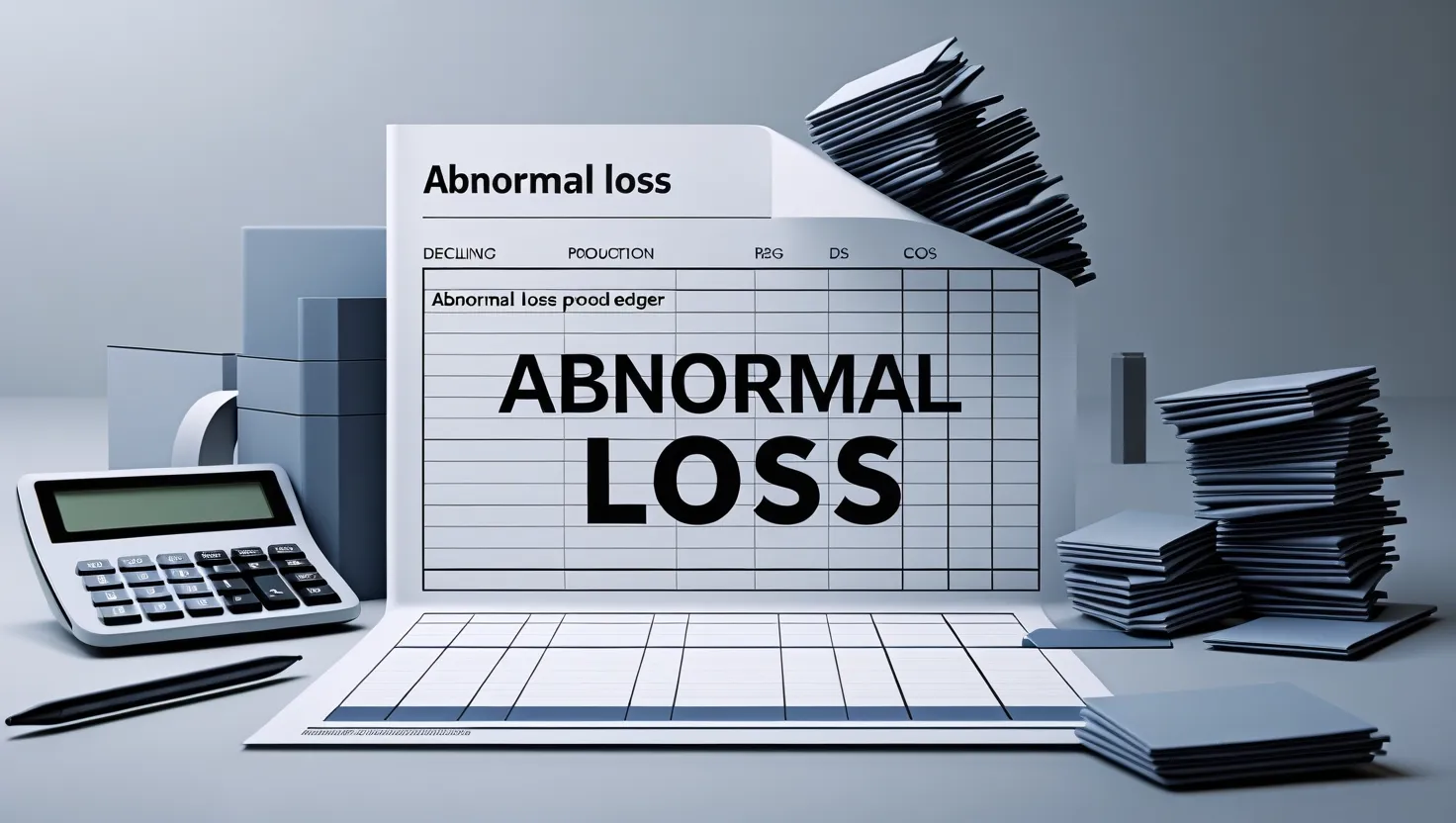
What is Abnormal Loss? #
Abnormal loss means unexpected costs that happen during business operations. These costs are different from regular losses, like small material waste. They occur because of unusual events, such as equipment failures, natural disasters, or theft.
Understanding abnormal loss is crucial for business owners. If not managed well, it can impact financial planning and reduce profits. This guide will explain abnormal loss in simple terms and show you how to handle it effectively.
Why Abnormal Loss Matters in Business? #
We expect some business losses. For example, a factory may have leftover material when cutting fabric for clothes. We will include this in production costs.
Abnormal loss is unexpected. It occurs because of accidents or system failures. For example:
- A machine in a bakery suddenly breaks down, ruining a batch of bread.
- A storm damages a warehouse, destroying stored products.
- A thief enters a retail store and steals expensive inventory.
These sudden losses hurt the business financially. To remain stable, small businesses must track and control such losses.
Key Features of Abnormal Loss #
- Unexpected – It occurs due to unpredictable events like accidents or bad weather.
- Disruptive – It can stop production or service delivery.
- Expensive – It results in large, unplanned financial losses.
- Event-Based – It happens because of specific events, such as equipment failure or theft.
- Requires Separate Accounting – Abnormal losses need proper documentation for accurate financial reporting.
Difference Between Normal and Abnormal Loss #
| Feature | Normal Loss | Abnormal Loss |
|---|---|---|
| Expectation | Planned and expected | Happens suddenly |
| Cause | Natural inefficiencies (e.g., minor material waste) | Unexpected events (e.g., fire, machine breakdown) |
| Accounting Treatment | Included in production costs | Recorded separately |
| Impact on Business | Small effect on business finances | Can cause significant financial loss |
Knowing this difference helps businesses plan better and protect profits.
Why Managing Abnormal Loss is Important? #
- Accurate Financial Records – Helps track unexpected expenses to maintain transparency.
- Better Decisions – Businesses can adjust budgets and plan for future risks.
- Cost Efficiency – Helps identify ways to reduce unnecessary expenses.
- Preparedness for Emergencies – Allows businesses to deal with losses without major disruptions.
- Stronger Business Resilience – Improves company stability despite unexpected shocks.
How to Identify and Handle Abnormal Loss? #
- Conduct Regular Audits: Check the inventory, machines, and financial records often. This helps you find any losses quickly.
- Set Clear Rules: Define what is normal and abnormal loss. This helps employees know how to report issues.
- Maintain Proper Records: Keep a record of every loss. Write down what caused it and how it impacted the business. Also, note any actions taken.
- Analyze the Impact: Learn how abnormal loss affects production costs and profits.
- Report the Loss Separately: Make sure to keep financial records clear for accurate business evaluation.
- Use Insurance Coverage: If insured, file claims to recover part of the loss.
- Implement Preventive Measures: Make changes to prevent similar losses in the future. This can include regular maintenance, better security, and updated safety rules.
Challenges in Managing Abnormal Loss #
- Hard to Identify – It can be tricky to determine if a loss is normal or abnormal.
- Complex Accounting Requirements – Special accounting rules must be applied, which may require expert knowledge.
- Resistance to Change – Employees may oppose new preventive measures.
- Limited Resources – Small businesses may have fewer funds to invest in loss prevention.
Best Practices to Reduce Abnormal Loss #
- Train Employees Regularly – Teach safety protocols, risk prevention, and emergency responses.
- Use Technology – Adopt accounting and inventory tracking software for better control.
- Service Equipment Consistently – Maintain machinery to reduce unexpected breakdowns.
- Get the Right Insurance – Secure coverage for potential business risks.
- Encourage Continuous Improvement – Keep reviewing processes to find better solutions.
FAQ’s: #
1. What is abnormal loss?
Abnormal loss means unexpected business costs from accidents, system failures, or disasters.
2. How is abnormal loss different from normal loss?
Producers expect normal loss and add it to production costs. They see abnormal loss as sudden and unplanned, so they record it separately.
3. Why is managing abnormal loss important?
It keeps financial records accurate, makes better decisions, and builds stronger business resilience.
4. How can businesses reduce abnormal loss?
Regular audits, good record-keeping, insurance, employee training, and equipment servicing are essential for smooth operations.
5. What are common challenges in handling abnormal loss?
Identifying losses can be hard. Accounting can be complex. Employees may resist change. We may have limited resources.
Conclusion #
Effective management of abnormal losses enhances financial stability and protects profits for businesses.
Use Vyapar App to handle billing, stock & payments all in one place.
Make bills, track stock, and handle payments in one place.
